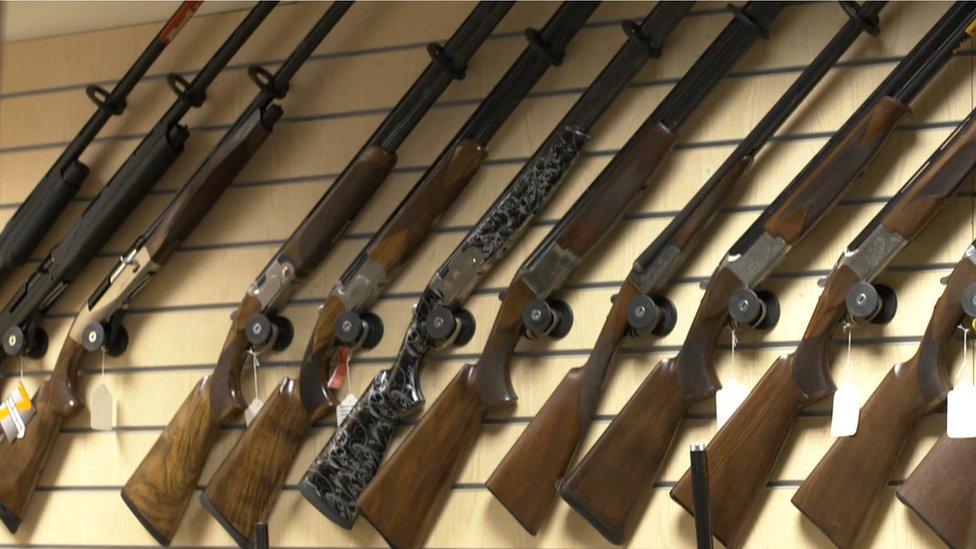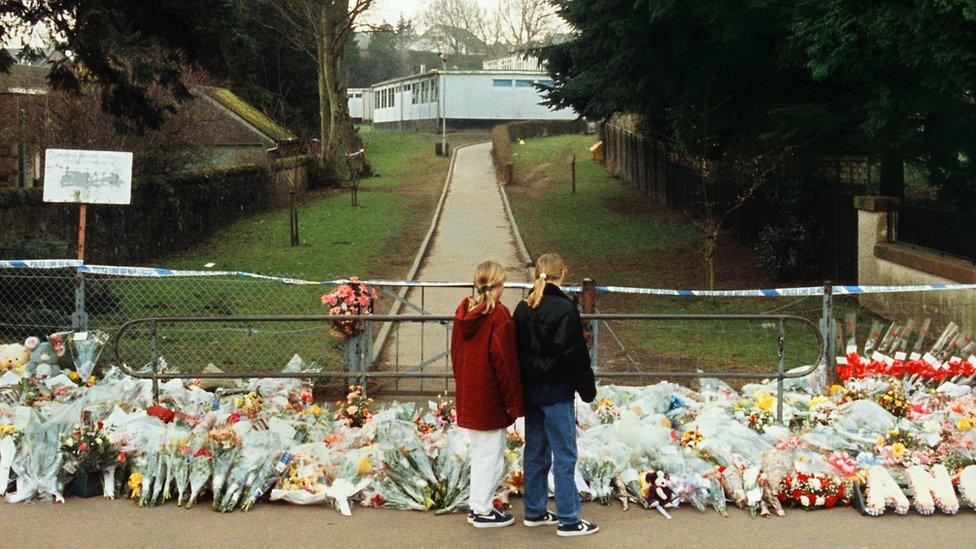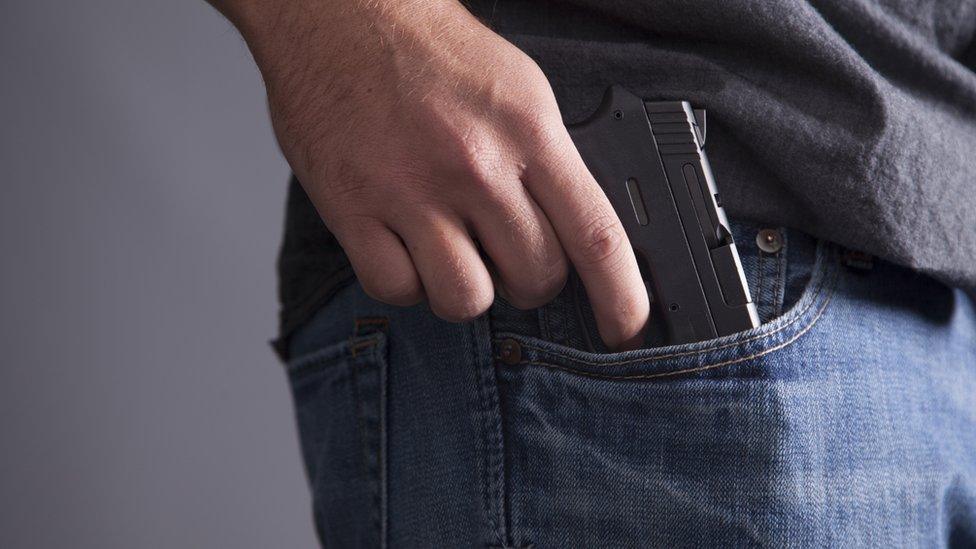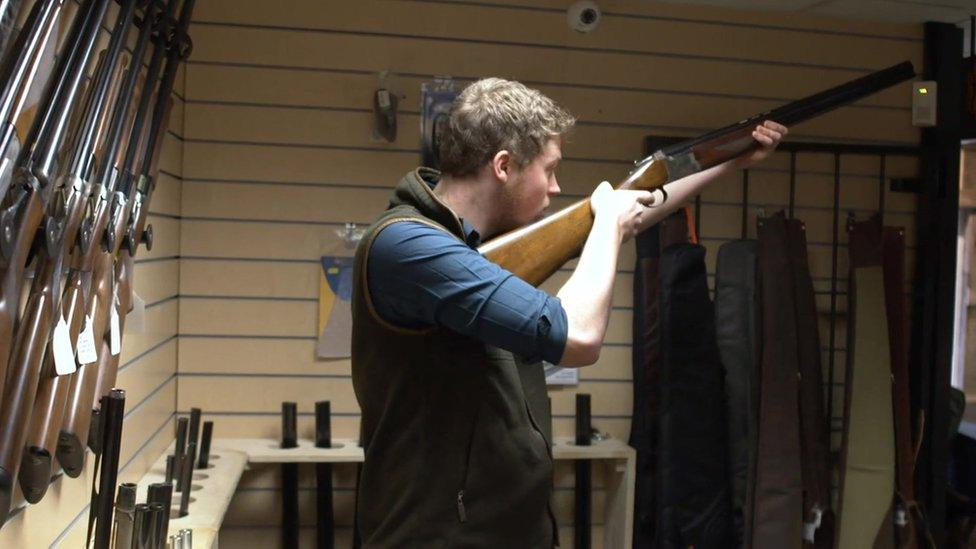The people who want the UK's gun laws relaxed
- Published
Callum Long-Collins believes UK gun owners are misunderstood
Gun debate in Britain tends to focus on what is happening in the US, but more than 700,000 firearm owners live in England and Wales. Who are they, and why do some want laws relaxed?
"It's frustrating for me that when you tell someone you own a gun you're instantly labelled a weirdo. It's like a secret society," Callum Long-Collins explains from a gun shop in Botley Mills, Hampshire.
He owns seven firearms, but did not want to show them in his own home in case it gave the wrong impression and scared the neighbours.
"What people jump to is that I own guns for illicit reasons. But I have absolutely no intention of using a gun in the bad way - I just enjoy the sport of shooting," he adds.
Long-Collins runs a YouTube channel called English Shooting, which campaigns for changes in gun regulations.
Currently, firearms including manually-loaded rifles and shotguns are permitted for sporting and hunting purposes once a holder obtains a licence, issued by local police forces.

The gun shop sells a range of shotguns to licence holders
But Long-Collins believes semi-automatic rifles and handguns should also be added to the list, and dismisses potential safety concerns.
"[For most people] in the UK, you only see guns being used by the police or in video games. People aren't going to know the procedures and the application process," he says.
There may be an urban-rural split. Many farmers need shotguns for work. But when I approached people on the streets of London - a far cry from the country farms where guns are part of the furniture - they largely reacted with confusion and disbelief when the subject of legal gun ownership was approached.
In fact, there are currently more than 700,000 private gun owners in England and Wales and 1.8 million firearms - the most since records began - according to Her Majesty's Inspectorate of Constabulary (HMIC).

Find out more
The Victoria Derbyshire programme is broadcast on weekdays at 09:15 GMT on BBC Two and the BBC News channel. Watch Benjamin Zand's full film online.

The debate in Britain, however, largely concerns US gun laws - where the Second Amendment grants the right to bear arms.
But what does Long-Collins think about using guns for self-defence?
"Criminals are, I think, laughing at us at the moment," he says, seemingly reluctant to speak openly while on camera. "They know a lot of people are scared to do anything offensive in their home because of the repercussions."
The last real conversation around guns in the UK followed the Cumbria massacre in 2010, when Derrick Bird shot dead 12 people and injured 11 with a licensed rifle.
But many gun owners say focusing on events like this demonises the whole community, even though mass shootings are rare occurrences.

Flowers were laid outside Dunblane Primary School following the 1996 massacre
"Every time there's an incident the government go after legitimate licence holders, tighten the rules up and force a few more people out of the sport," rifle instructor Alan Warren says.
Following the 1987 Hungerford massacre, in which 14 people were killed, semi-automatic "centrefire" rifles were banned. Ten years later, after a lone gunman killed 16 children and a teacher at a primary school in Dunblane, handguns were made illegal too.
Warren claims these incidents were the fault of poor police checks rather than the guns being legal, and that the perpetrators should never have been granted a licence in the first place.
"A gun is no more dangerous than your car. If it's driven badly and used wrongly, it's dangerous. You can go out and have an accident in your car - they don't then ban all cars."

UK gun laws

1997 legislation prohibits ownership of easy-to-conceal firearms, such as handguns
Firearms can only be owned by members of the public for use during hunting and sport.
Manually-loaded rifles, shotguns and long-barrelled pistols fall into this category, and all require a firearms or shotgun certificate to possess them.
Those applying for licences must be assessed by police to ensure they are not a danger to public safety.
The applicant must also provide a safe storage space for the gun and have access to land suitable for its use, or be a member of a sports club.
Handguns and other easy-to-conceal firearms are prohibited, as are "centrefire" semi-automatic rifles.
Source: Home Office

But others believe gun laws need to be tightened further. A 2015 report from HMIC concluded that forces were "sometimes inexcusably compromising public safety" by failing to follow Home Office guidance.
While gun owners must reapply for their licences every five years, and should receive regular home visits from the police in between these times, the report said different forces were providing varying levels of service.
Seven forces, it found, did not deal correctly with expired licences, leaving holders in possession of their firearms without certification.
As a result, the body is now calling for stricter and more detailed guidelines that chief constables should be obliged to follow.
Gun store manager Jonathan Carter says once someone has their licence, it is those behind the till that decide whether or not they should be served.

Jonathan Carter was first introduced to guns in his early teens by his father, a farmer
"Everyone who comes in here, we chat to them," he explains. "If you were stood there shaking, agitated, sweating, I would probably figure something was wrong.
"But even the lowliest sales guy in the gun shop has that pressure on them - they can go to prison and get fines for making simple mistakes."
Some would see this as further proof of the need for additional regulation.
Carter himself is the son of a farmer, and was familiar with guns from a young age. But for much of the urban population, the UK's gun scene probably seems like a foreign concept.
Many find it difficult to come to terms with the fact that a neighbour could legally have a firearm stored in their cupboard. Gun ownership in the UK may be on the rise, but it appears awareness is not.
Subscribe to the BBC News Magazine's email newsletter to get articles sent to your inbox.